The Best Checklist for a First-Time Backpacker
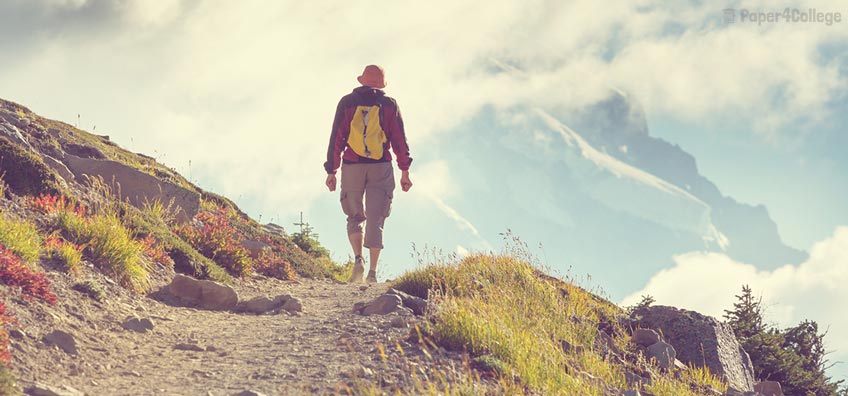
If you have chosen backpacking as the way to spend your free time, then you are either at least a second-time backpacker who really loved the experience, or someone who is simply fond of trying such challenging activities like this. Probably, you even appear to be one of those guys who say to themselves: “I always find time to write my paper, but I can never find time just to live. I’d prefer the latter”.
Well, whatever the reason why you’re going to backpack in the nearest future is, it will certainly be a great chance to add some zest into your life and take a good breath of fresh air.
On the other hand, however spontaneous your decision to go backpacking may be, its successful implementation should be carefully thought through and over. Everything from the number of socks you take to the price of a hostel room you book should be taken into consideration and approached quite seriously.
In order not to get lost in the heaps of “really necessary” things scattered here and there all over your room, especially when it’s going to be your very first backpacking trip, a clear and well-organized checklist seems vitally important. Even professional backpackers can’t go without it when getting ready for another challenge. However, unlike novices, they have a well-structured plan of their load which can be slightly altered depending on what their new destination may require.
So here you’ll find some basics of effective packing for your first backpacking experience. If you get really imbued with the general atmosphere and style of such a trip, (bet, you will!), then this checklist will become a good helper for all your nest journeys and adventures.
At First, Make Sure You Know What Backpacking Implies
On the one hand, the term “backpacking” seems quite clear: it’s when you pack your big bag, place it on your back and set up for an exciting and long journey. However, this is rather general idea of this activity.
Indeed, traditional backpacking mostly covers long-term trips, which usually include:
- visiting several different places;
- availing yourself of limited budget;
- packing the limited amount of baggage.
Also, today there are a few varieties of this particular form of traveling. The most significant differences between them mainly relate to the things a backpacker takes with him or her. For example, a so called ultralight backpackers would prefer lighter and smaller backpacks, lightweight clothes, portable sleeping bags, quick drying towels, and many other handy widgets for traveling.
Besides, backpacking can be sometimes mistaken with hiking. The latter mostly refers to a light one-day trek in the woods, and not to a longer trip to and around many different places.
Why Do These Details Actually Matter?
“I think I’m not going to write my essay on it, so why do I need all this theory? The idea of backpacking is rather self-evident”, that’s what you may say. Such attitude is understandable. Why on earth do we always complicate obvious things?
Indeed, at first sight it may seem that there’s hardly any necessity to distinguish and dig deep into diverse forms of backpacking as well as other related activities. However, you should know at least that they exist and that they really differ from each other to a greater or lesser extent.
The thing is that the variety of traveling equipment is closely connected to the differences featured by these activities. Let’s have a look at the following example from practice.
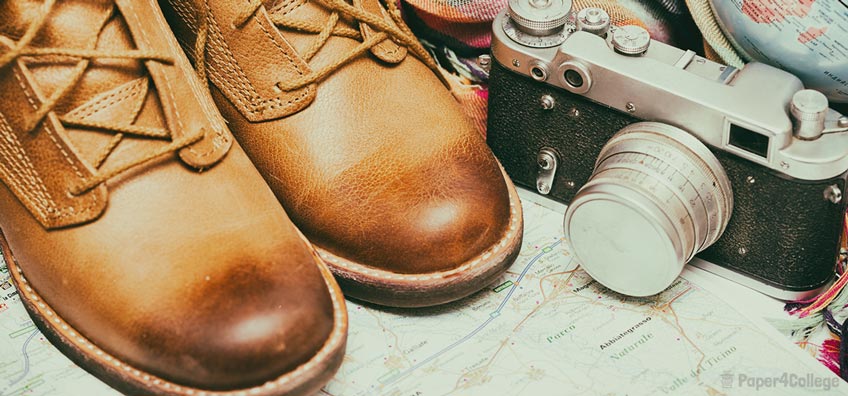
Both backpacking and hiking are about walking. However, as backpacking implies a far journey, really suitable boots for this particular activity should be higher and their soles should be thicker than those of hiking boots. Consequently, if you take the wrong pair of boots, your backpacking trip can turn out very uncomfortable and just disappointing.
So, you see how considering a few theoretical issues can help you foresee such essential traveling issues as your comfort and good mood.
Then Define What Such Experience Can Mean to You
Before trying something absolutely new, especially such challenging activities as backpacking, you should think carefully about your reasons to do it. Ask yourself what exactly you expect from this experience. By stating clearly your expectations, ideas or, maybe, even some forecasts, you will be able to set a few positive guidelines for your trip. They can help you cope with some possible traveling annoyances and keep your spirit up whatever may happen.
Probably, you’re inspired by a travel blogger who writes about his or her backpacking experience and adventures, sharing magnificent photos of places which you could only see in movies and in your dreams. Or you may need to escape from your daily routine and throw yourself into something brand-new: something that goes beyond the limits of your normal lifestyle.
Whatever has prompted you to come up with such a decision, let’s see what your first backpacking experience can give you. Almost for free, by the way.
A Different Scene, Definitely
Sometimes you may feel really bored with the same houses and streets you see every day. Your eyes seem to long for some new beautiful sceneries, while your brain needs some fresh air. Take it both literally and figuratively.
Loads of the Most Diverse Experiences
Backpacking can teach you everything from saving money to resolving unplanned and unexpected situations, however hopeless they may seem at first. After such a trip, you’re very likely to understand what it means to feel like a different person. Probably, never again will you be the one who you used to be before your first trip.
Inspiration for Study and/or Work
New impressions, experiences and senses will give your brain enough energy to generate new ideas and solutions. You’ll be surprised by the fact that “yes, I know what to write my essay about” or “yes, I know what to start my project from”.
You Can Learn People Closer and Better
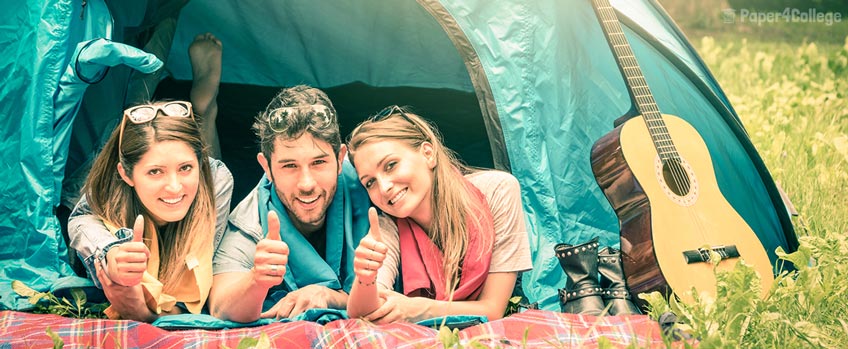
Someone wise once said that if you want to learn a person better, go traveling together with him or her. Backpacking with a good friend or a company of guys who you know for a longer or shorter period of time will give you a chance to watch how they act when they’re out of their comfort zones. Challenging situations often reveal our true characters, so if watching carefully, you’ll discover many interesting things about the nature of your fellow creature.
Many Nice and Memorable Small Things
Photos, postcards, souvenirs or pine cones and dried flowers will become some pleasant reminders of the great backpacking time you had.
Now Make Your Beginner-Backpacker’s Plan of the Trip
As it’s the first time you’re getting ready for a backpacking trip, you should have a clear and smart action plan for it. In its turn, such plan will help you make the clever list of the things you need to take with you (we’ll discuss it below in detail).
-
1. Make Sure You Have a Company
It’s often recommended to take your first backpacking challenge either with someone who has already had such experience or at least with someone who you know well enough and can rely on with 100% confidence even though backpacking is something as new for him or her as for you. Agree that you’d feel much more comfortable and confident with a good companion by your side.
-
2. Plan Your Route and Learn More About Your Destination
Whether it’s going to be a rather short trip to one place like a national park or a longer tour to and around several towns, you should always plan
- how you’ll get to your destination;
- what you want to see or do there;
- a few possible alternatives for transport or activities in order to be able to cope with possible force majeure.
Besides, you could search for some information about the destination you’ve chosen for your trip, especially if you’re planning to go abroad. You probably heard that there may be some cultural misunderstandings or even conflicts between people from too different cultural environments. So, it would be very useful to know something about customs or just everyday habits of locals in order not to get into a tight corner with them.
“Sounds like something handy I can use to write my essay on xenophobia issues”, a paper-writing-geek backpacker may comment. That’s right. The info you’ll find before and during your backpacking adventures can be really valuable not only for a college essay but also for a short cultural research article.
Some Essential Remarks
- Experienced travelers will tell you that you’d better not build a detailed plan for the whole route or trip in advance, because you can never predict neither positive nor, unfortunately, negative circumstances which may break it. That’s why you should always leave a little gap in your trip arrangements. It will provide you with more flexibility as well as help you avoid some unwanted expenses or even more serious issues.
- Basing on these considerations, it would be reasonable to plan how you can get to your destination (especially the first one), where you can afford to stay and what you can eat there. Any other decisions can be made on-site.
- Various traveling blogs and forums are definitely the best sources of the most helpful information on backpacking. So, you can apply to them in order to learn more detailed information on everything that can be interesting and necessary for you in terms of this kind of activity.
-
3. Consider Your Shelter
Of course, it depends on where you’re planning to go and how much time your whole trip is going to take. Whether you’re going to stay in a hostel or at a couchsurfer’s place, you should arrange everything in advance at least for your first destination, as it’s been mentioned above. In case you choose a tent as your shelter for all your backpacking trip, you should make sure it satisfies all safety requirements and standards of traveling equipment.
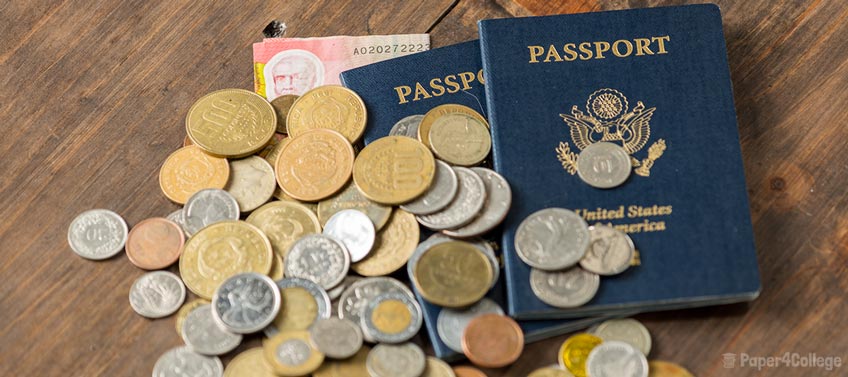
-
4. Prepare All Compulsory Documents
Your ID should be the very first thing to prepare for packing wherever you’re going. Don’t forget your student card as well. It can provide you with nice discounts at some cafes and hostels. However, you should check beforehand in which particular cases you’ll be able to use it during your trip.
Also, in case you go backpack around a national park or some other natural tourist attractions, you should find out whether you’ll need any special permissions or other documents to visit it.
If you choose a different country for backpacking, you should firstly check the requirements it sets for foreign tourists and students regarding the visa regime. Secondly, you should also find out more about the backpacking regulations in that particular region where you plan to go.
By the way, this is another good topic if you find suddenly yourself thinking: “I don’t know what to write my essay on”.
-
5. Think About Some Special Things You May Need
After you discover more about the destination you’ve chosen, think carefully about some special items that can appear to be vitally important for a comfortable and safe trip. For example, it may be a pair of special gloves if you go to the mountains, or a good off-line app with detailed maps of different countries and cities if you go abroad.
-
6. Complete Your Main List of Essentials
Making a list of the things you need to take with you isn’t a very good excuse to say “that’s why I didn’t have time to write my essay and hand it in promptly”, but still it’s a very important part of your preparation which may require quite much time. Include the following points:
- backpack;
- navigation items (map, compass, GPS);
- first-aid items and essential cosmetics;
- illumination devices and items to make fire;
- essential clothes and footwear;
- food and drink;
- sun/cold/insects protection items;
- dishes and utensils;
- repair tools (including needles and threads).
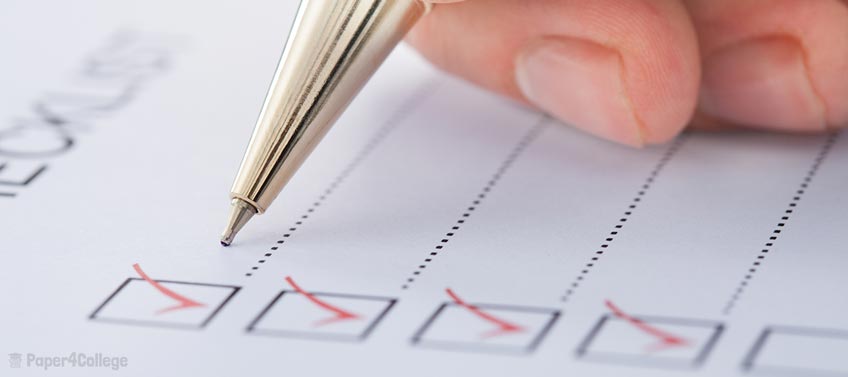
Backpackers’ Axiom
You can never take everything you want, and there always appears to be something you forget to take.
P.S. Sum your approximate expenses up, check everything once again and enjoy your backpacking time!
